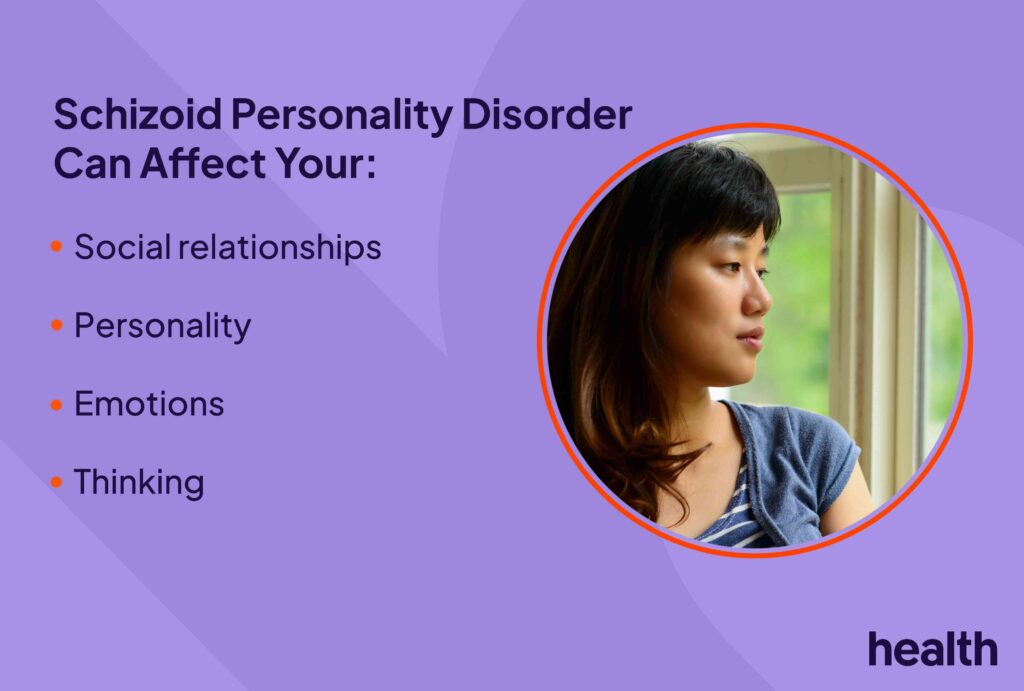:max_bytes(150000):strip_icc():format(jpeg)/Health-Schizoid-Purple-Horiz-fb473953154541ccb22a54a58cb4a745.jpg)
Schizoid personality disorder (ScPD) causes traits like having few social relationships, being extremely detached in social situations, and rarely expressing emotions.
People with schizoid personality disorder can have symptoms that affect four aspects of their lives: social relationships, personality, emotions, and cognition (thinking). ScPD usually begins in late adolescence or early adulthood and is lifelong.
Design by Health / Stocksy
Differences in social skills are among the most prominent schizoid personality disorder symptoms. People with this condition:
- Usually show no desire to form close relationships with other people
- Often don’t develop close relationships with their relatives
- Typically have no close friends or meaningful community
- Rarely date or get married
- Seldom engage in sexual activity
- Often prefer to spend time alone and engage in solo hobbies
Schizoid personality disorder has profound effects on a person’s temperament, moods, body language, and behavior. People with schizoid personality disorder often:
- Appear cold, distant, uncaring, or uninterested in others
- Dislike getting involved in everyday events
- Rarely make eye contact
- Seem highly uncomfortable in social situations
- Speak very little or answer questions with quick and short answers
- Seem unmoved by what others think of them
- Don’t notice typical social cues or react emotionally to social situations
People with schizoid personality disorder seem to experience a lack of emotions or very limited emotional reactions. They may:
- Not react emotionally, even during momentous occasions or when faced with serious challenges
- Have passive responses to significant life events, making them seem directionless or uninterested
- Rarely express anger, even when others incite them
- Seldom show joy or pleasure for physically pleasurable experiences, like having sex, spending time in nature, or playing sports
People with schizoid personality disorder experience cognitive symptoms, which affect thinking and thought patterns. This may cause:
- Linear thoughts that progress from one thought to another
- A lack of logical or critical thinking
- Disorganized thought patterns at times
There’s little information about how schizoid personality disorder looks in children. Personality disorder symptoms generally develop by the time a child reaches adolescence or early adulthood. That’s why mental health professionals don’t diagnose someone with a personality disorder until after they turn 18.
Research suggests that children who have major depressive disorder are more likely to develop a personality disorder later in their life.
Schizoid personality disorder is almost always chronic, meaning that it’s a lifelong condition. Although the symptoms typically remain throughout your lifetime, treatment may lead to a better and more stable quality of life. People receiving treatment are also less likely to develop comorbidities or complications.
Those who don’t receive treatment may develop certain complications, such as:
Most people with schizoid personality disorder don’t seek help, often because of social isolation or because they don’t perceive there to be a problem. A healthcare provider or concerned family member usually brings up the disorder and encourages their loved one to seek diagnosis or treatment.
If you are the loved one of someone who has been diagnosed with schizoid personality disorder or who you suspect has it, you should watch for any concerning symptoms. Talk to your loved one and reach out to a healthcare provider immediately if you see signs of:
- Schizophrenia symptoms, such as delusions or hallucinations
- Difficulty taking care of oneself
- Suicidal ideation
- Substance use
Schizoid personality disorder causes a lack of interest in socializing with others, a cold or aloof personality, and flat or emotionless reactions to significant events. This condition can affect social relationships, personality, emotions, and thinking.
Most people with this condition don’t seek support from a healthcare provider. If you’re a loved one of someone who may have this personality disorder, keep an eye on their well-being and talk to a healthcare provider about your concerns.



